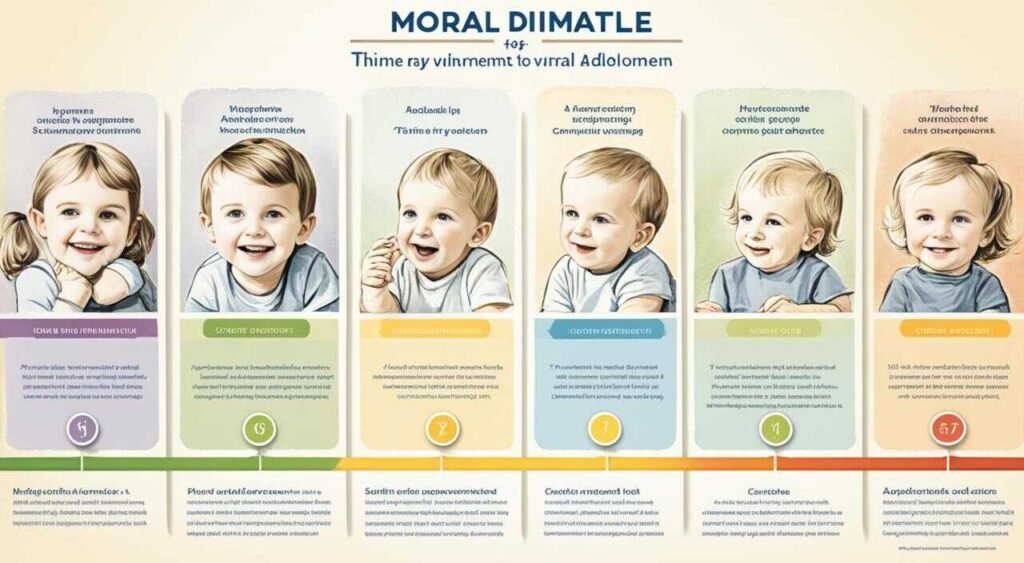The law says kids know right from wrong between ages 7 to 15, depending on where they live. The Roman Catholic Church says they hit this understanding at 7. But, developmental psychologists are not so sure. They do know a child’s moral sense grows over time.
Exploring moral development, it’s clear kids learn right and wrong in different ways. This learning involves thinking and feeling. It’s shaped by how they’re taught, their surroundings, and the people they look up to.
Key Takeaways
- The law and religions disagree on the age kids learn morality.
- Moral growth is complex, blending thought, feeling, and the world around us.
- We don’t know for sure at what age kids completely get right and wrong.
- How parents teach, community impact, and who kids admire are key to their morals.
- Developing a conscience means learning with our brain and heart together.
Understanding Moral Development in Children
Moral development is a journey that starts in childhood. It’s powered by empathy, knowing and managing emotions, and thinking things through. As a parent or caregiver, knowing about this journey helps in growing a child’s sense of right and wrong.
The Role of Empathy and Emotions
Empathy is key to noticing and caring about how others feel. It kicks in early in life and helps build a child’s moral foundation. But, if a child doesn’t feel emotionally safe, their empathy might not grow strong. Guilt and shame also help shape a child’s sense of what’s right and wrong.
Cognitive Stages of Moral Reasoning
As kids get older, their moral thoughts change. At first, it might be all about what happens because of something. They might think breaking three glasses is worse, not knowing the story. By 7-8 years old, they start to see things differently. They care more about someone’s intent behind an action. They also learn more about justice and fairness. This is when kids start to believe in following rules and thinking revenge is not the answer.
Impact of Parenting Styles
How parents teach and discipline really matters in moral growth. Authoritative parenting is considered the best. It’s about setting clear rules and reasons for them. This method grows kids who respect rules and build their own strong moral guide. On the flip side, autocratic or permissive ways can lessen the development of moral values.
at what age does a child know right from wrong
Young kids decide if an action is bad mostly by the bad results it leads to. For example, they might think a child who broke three glasses is worse than one who broke only one. But around 7 or 8 years old, they understand something new about intent.
They learn that if something is done on accident, it’s not as bad as when it’s done on purpose. At this point, they start to think rules are important and that getting back at someone is not the right thing to do.
Distinguishing Intent and Consequences
At first, children look at the bad results of an action only. So, they might blame a child who broke three glasses by accident more than one who broke one on purpose. But by 7 or 8, they realize that the intent behind an action is key, not just the outcome.
Developing a Sense of Justice and Fairness
Around 7 or 8, kids also start to really care about fairness and following rules. They believe in the importance of not getting even, even if someone does something that causes trouble. This is a big part of how their moral sense grows. They learn that what’s right and wrong goes beyond personal feelings and right to the heart of fairness and what’s best for everyone.
Nurturing a Child’s Moral Compass
Parents are key to helping their kids learn right from wrong. The best way to do this is through authoritative parenting. It means setting clear rules and explaining why they matter. By doing this, children learn to respect rules and develop their own sense of right and wrong.
Authoritative Parenting and Explaining Moral Reasoning
Authoritative parents combine setting rules with explaining their reasons. This helps children see why following moral guidelines is important. Rather than following rules blindly, they understand the value behind them. This makes them more likely to make good choices as they grow up.
The Influence of Community and Role Models
Aside from parents, the broader community also plays a part in children’s moral growth. Teachers, coaches, and other important people in a child’s life can either support or weaken what parents teach. Good role models are crucial. They show children what it means to live by strong ethical values. On the flip side, conflicting messages can make it hard for kids to know what’s right.
Moral Development by Age

Children’s moral growth is a journey that starts at birth. They begin by learning to bond with others and know what feels good or not. Then, as they grow, they start to understand how to follow rules and consider others’ needs.
With time, kids become better at knowing right from wrong. They also learn to care for those around them, showing more empathy and compassion. Gradually, they understand fairness, fairness, and go after what’s right.
The Three Pillars of Conscience
Conscience helps us tell what’s right from what’s wrong, guiding moral growth. It’s made up of three key parts – understanding, emotion, and a strong dislike for bad deeds. This trio forms the three pillars of conscience.
Knowing the Good: Cognitive Understanding
The first pillar is simply knowing what’s morally right or wrong. Kids learn over time, picking up reasons for rules and values. This knowledge helps them think clearly when faced with tough choices.
Loving the Good: Emotional Connection
But reason isn’t enough. Kids need to emotionally connect with being good too. Feeling for others and caring about acting right really matter. This makes them want to do good things because they feel strongly about it.
Doing the Good: Gut-Wrenching Aversion to Wrong
Lastly, kids should just really feel terrible about doing wrong, not just know it’s bad. This deep-in-your-gut feeling completes their moral compass. It gives them the strength to say no to bad choices, even when it’s tough.
Parents and the community can help with all this. By supporting these three aspects, they help children build a solid moral guide for life’s twists and turns.
Conclusion
Kids learn about right and wrong over many years. It involves how they think, feel, and act. There’s not one age where a child knows everything about morals. But, parents and society can help a lot.
Children learn best when they get explanations and see good examples. By teaching them to think, feel, and act right, we help build a strong conscience. This is key for kids to handle moral issues in life.
To finish, it’s vital to equip children with the right skills and support. This helps them make good choices and be kind members of their community.
FAQ
At what age does a child know right from wrong?
Children usually start understanding right from wrong around ages 7 to 15, depending on where they live. Yet, exactly when this awareness forms isn’t clear. Experts believe it starts young, but complete understanding comes over time.
How does a child’s moral development progress?
Moral growth mixes thinking and feeling. It takes in how parents teach, the community’s influence, and what kids see around them. Feelings like empathy and guilt, aside from thinking about fairness, play big roles.
Kids move from simple self-interest to more complicated ideas of what’s right for everyone. It’s a step-by-step process.
How do parenting styles impact a child’s moral development?
How parents raise kids can greatly influence their morals. Methods of teaching right and wrong, whether strict or flexible, leave big impacts. For most children, parenting that’s both firm and explains rules clearly works best.
How does a child’s understanding of right and wrong evolve over time?
Moral learning kicks in from birth. Babies start to tell good from bad as they feel different things. As they grow, children learn more about rules and what’s fair.
By the time kids are in school, they start to question but also accept authority. They begin to shape their own moral code. Teens, especially, explore various value systems and deeper moral questions.
What are the key elements of a child’s conscience?
A child’s conscience has three parts: knowing what’s right and wrong, feeling good about doing right, and not liking wrong actions. To fully develop, a kid’s moral compass needs thoughts, feelings, and instincts working together.





